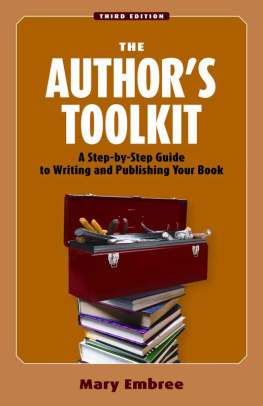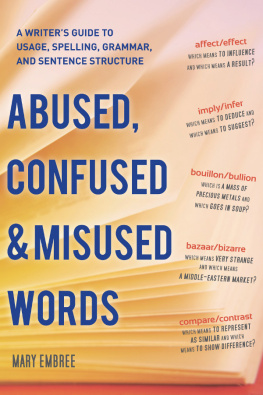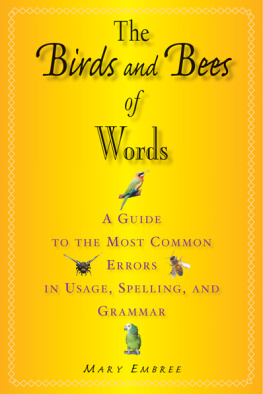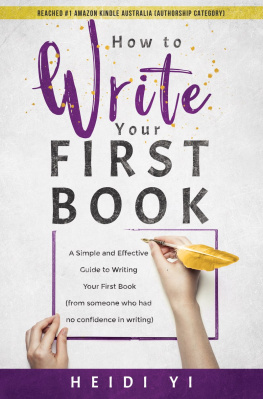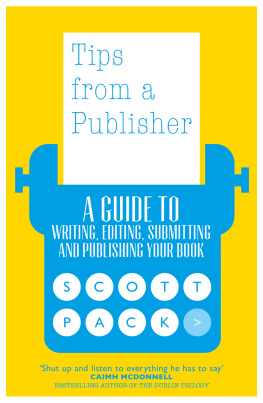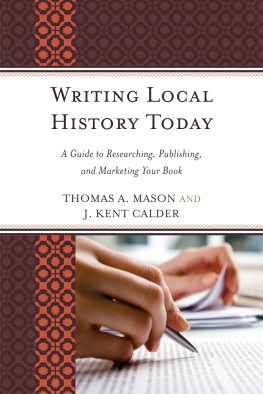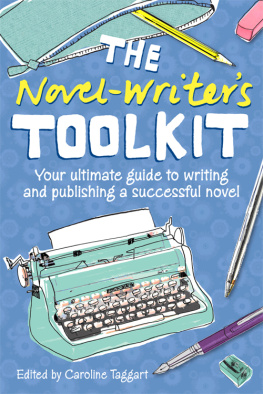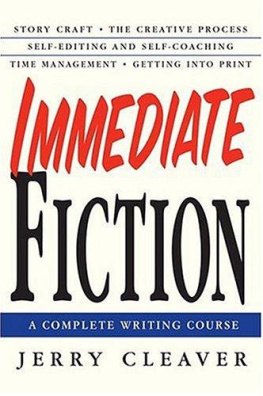THE
AUTHORS
TOOLKIT
THE
AUTHORS
TOOLKIT
THIRD EDITION
Mary Embree

2010 by Mary Embree
All rights reserved. Copyright under Berne Copyright Convention,
Universal Copyright Convention, and Pan American Copyright
Convention. No part of this book may be reproduced, stored in
a retrieval system, or transmitted in any form, or by any means,
electronic, mechanical, photocopying, recording, or otherwise,
without prior permission of the publisher.
14 13 12 11 10 5 4 3 2 1
Published by Allworth Press
An imprint of Allworth Communications, Inc.
10 East 23rd Street, New York, NY 10010.
Cover and interior design by Charlie Sharp, Sharp Des!gns,
Lansing, MI
Page composition/typography by Sharp Des!gns
ISBN: 978-1-58115-747-5
eISBN: 978-1-58115-776-5
LIBRARY OF CONGRESS CATALOGING-IN-PUBLICATION DATA
Embree, Mary, 1932
Authors toolkit : a step-by-step guide to writing and publishing your book /
by Mary Embree. 3rd ed.
p. cm.
Includes bibliographical references and index.
ISBN 978-1-58115-747-5 (pbk. : alk. paper)
1. Authorship. 2. AuthorshipMarketing. I. Title.
PN147.E43 2010
808.0202dc22
2010027596
Printed in the United States of America
INTRODUCTION
T here have been large-scale changes since the second edition of Authors Toolkit was published seven years ago. In 2003 the millennium was still in its infancy with all the promise of a newbornrobust and looking forward to growing prosperity. But the economy stumbled in 2008 and everything changed. Along with changes, even negative ones, however, new opportunities will arise. Along with the bad news there is always some good news if we keep an eye out for it.
The bad news is we are experiencing the worst economic downturn since the Great Depression, not just in the United States but all over the world. The publishing industry, from newspaper and magazine publishers to book publishers, has felt the impact of this deep recession along with nearly every other major industry. Most independent bookstores have been struggling to make a profit and some have shut their doors permanently. Funding for public libraries has decreased and those that are still open have had to cut their hours of operation significantly.
The face of publishing has been changed not only by world events but also by innovative technology. With more people getting their news and information free online, the circulations of printed paper editions have been falling. Books are still being published and new authors are still getting publishing deals, but it is harder now. Most publishers want a sure thing, so an author has to have a lot going for him or her to secure a publishing contract.
Even though that is bad news for writers, there is good news too. Especially for writers who are also entrepreneurs, because right now self-publishing is easier and less expensive than it has ever been. There are many ways to promote books that werent available to author-publishers even a few short years ago. And many of them are free, such as Facebook and Twitter. For a small charge you can even have your own Web site where prospective buyers can learn more about you and your books. And even if you dont get them into the major bookstores, you can sell your books from your Web site as well as on Amazon.com and eBay. In fact, you might sell more that way than you would in traditional bookstores.
Whether you are seeking a publisher or planning to publish your book yourself, the third edition of Authors Toolkit is here to help you every step of the way. This edition covers all of the pertinent information that was in the prior one, updates some of the chapters, and adds new chapters, bringing it as up-to-date as possible in our rapidly changing world. It covers some of the enormous advances in technology that have altered the business of publishing forever and suggests ways that todays authors can adapt to them. It also goes into much more detail on how to publish your own book.
Printing costs are no longer a major concern since you can now have as few as twenty-five copies of your book printed digitally instead of a thousand, which used to be the case when offset printers were the only choice. Digital printers put out a high-quality book. Its hard to tell the difference between it and one produced on an offset printer now. And digital printing is faster.
There are print-on-demand (POD) companies that print just one book at a time and sometimes at the point of purchase. No more ordering more books printed than you can sell and then having to find a place in your garage to store them. In fact, you dont even have to print your book. You can sell it as an e-book that buyers can download over the Internet. In the future more and more books will be digitized and read on electronic book readers, e-readers for short. Even as printed paper media is shrinking, electronic media is expanding. There is more about this in the chapter on getting published.
If you have the time, the talent, and the knowledge to do most of it yourself, you might make more money publishing your own book than you would with an established publisher. As both the publisher and the author, you get to keep all the profit and you dont have to pay a literary agent 15 percent of your royalties. Of course, you are the one who will have to put up most of the money in front. You are the one taking the risk. However, if you put out a high-quality book that is well-written and professionally edited and if it is on a subject that interests a lot of readers and if you do a good job of marketing and promotion, you just might make your book a bestseller. Yes, there are quite a few ifs, but there are opportunities now that you never had before. There is so much you can do without having to spend a fortune. Many self-publishers have been very successful and you could very well become one of them.
This edition will again cover the basic guidelines of writing both fiction and nonfiction. Youll get some pointers on how to be less emotional and more objective about your own works. You will learn what you need to know to prepare a professional-quality manuscript. If you do not want to publish your book yourself, youll get advice on contacting an appropriate agent or publisher. Even in this economic climate there are still first-time authors who are getting excellent publishing contracts and turning out bestsellers.
There are some common pitfalls that even experienced writers can slip into and I will explain how to avoid them. Ill also give you some valuable principles you can apply both to your writing and editing.
Even in uncertain times there is reason for optimism because well always have books. They will be here in some form as long as there are writers to write them and readers to read them. Books will continue to be essential for entertainment and education. They provide information that can help us change our lives for the better. They allow us escape from boredom. They bring us adventure and comfort, pleasure and solace, imaginary love and vicarious revenge. Most of all, they reveal a new and exciting world for the reader to experience no matter what is going on in the real world.
As dedicated writers, you and I are in a very good place. We are the storytellers and educators of the world. And as long as there are booksin any formauthors will always be in demand.

Ideas are to literature what light is to painting.

Next page
